Generative AI and Student Success:
Supporting the Future of Higher Education
The evolving artificial intelligence (AI) landscape creates new resources to support college completion, but practitioners and policymakers must carefully consider how these resources can be approached with equity, economic opportunity, and students in mind at every step. Complete College America is exploring the new possibilities offered by AI to increase educational attainment and to include historically excluded voices in the development of new technology and the scaling of student success practices. AI has the potential to enhance work already happening across states, systems, and campuses to propel CCA’s mission forward. Generative AI can be an effective tool in the college attainment toolbox.
Institutions and organizations that embrace AI can not only harness new transformative tools but also equip students with the necessary skills and competencies to succeed in AI-driven industries, thereby propelling their long-term opportunities. This is just the beginning for AI–and Complete College America will continue to develop insights on policies, perspectives, and practices around equitable uses of and access to AI for postsecondary attainment and student success, creating a roadmap to navigate this new technological landscape.
CCA Council on AI

The CCA Council on AI has been instrumental in advancing the organization’s strategic approach to artificial intelligence in higher education throughout this year. The Council has established itself as both a thought leader and practical convener, publishing policy recommendations in April and November 2025, releasing the influential “Generating College Completion” report in July, which has informed institutional planning nationwide with over 1,000 downloads, and providing direct advisory services to CCA Accelerator institutions. Through in-person convenings in March and May 2025, the Council deepened its strategic work while ensuring that historically-excluded institutions remained central to AI discussions and resource development.
The Council’s impact extended across multiple networks throughout the year, from supporting knowledge sharing across the CCA’s Alliance, which represents 53 states and systems, to sustaining partnerships with technology companies, including Riipen, Ithaka S+R, Ad Astra, and Ellucian, that focus on increasing access and student success. The Council reached a significant milestone with the October 27-29 datathon at the Gates Foundation in Seattle, where institutional leaders, technology partners, and equity advocates engaged in hands-on work on data efficacy, building processes, and integration strategies. This practical work culminated in CCA’s strategic investment in organizational capacity through the hiring of Norman Palmer, CCA’s Director of Technology and Innovation, in October 2025, signaling the Council’s transition from framework development to scaled implementation and technical capacity building.
CCA Ai Readiness Consortium
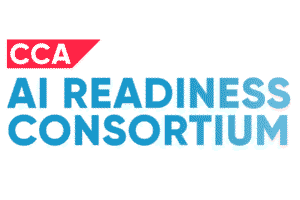
Built in collaboration with Riipen, the CCA AI Readiness Consortium assists institutions with embedding AI competencies into their academic programs through experiential learning, ensuring students are ready to thrive in an increasingly AI-driven job market.
Powered by Riipen’s work-based learning platform, the CCA AI Readiness Consortium unites educators, career services professionals and employers in a shared mission to expand equitable access to AI skills-building and experiential learning. Through project-based learning that directly involves industry partners, the program enables students to gain practical, in-demand skills that are especially critical for those in industries most vulnerable to AI-driven disruption. This initiative, funded by Axim Collaborative, seeks to make a lasting impact by enhancing economic and social mobility for students nationwide.
Building AI Capable Institutions
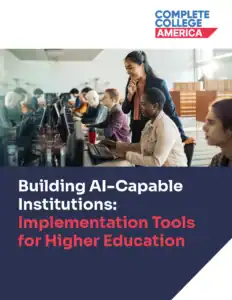
Building AI-Capable Institutions: Implementation Tools for Higher Education shifts the narrative of AI in higher education from disruptions and challenges to proven, real-world results. Three case studies demonstrate how colleges and universities are successfully harnessing AI to accelerate student success, boost college completion rates, and transform teaching and learning—without requiring massive budgets or complete institutional overhauls.
The playbook features detailed case studies from the University of Louisiana System, University of Massachusetts Lowell, and Arizona State University, showcasing innovative approaches that range from system-wide AI literacy microcredentials serving over 82,000 students to targeted faculty mini-grant programs fostering cross-disciplinary innovation. Each case study provides insights into both successes and challenges, paired with tactical lessons learned and practical tips for implementation. The case studies show how targeted initiatives can create meaningful impact while thoughtfully addressing critical concerns around equity, ethics, and academic integrity.
Read Building AI-Capable Institutions: Implementation Tools for Higher Education
Generating college completion
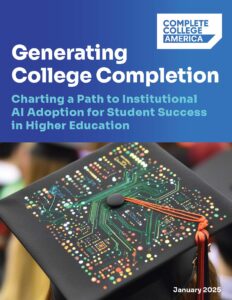
Generating College Completion: Charting a Path to Institutional AI Adoption for Student Success in Higher Education provides a comprehensive framework for institutional AI adoption in higher education, focusing on student success and completion.
The report examines different approaches to AI adoption, ranging from building in-house solutions to leveraging existing tools. It also outlines six essential AI competencies institutions need to develop:
- Mission alignment
- Resource management
- Responsible use
- Data and technology infrastructure
- Talent development
- Change management
Through detailed case studies of institutions, including the University of Michigan, Arizona State University, and Morehouse College, Generating College Completion demonstrates how different types of colleges are successfully implementing AI strategies. The report also addresses the foundational requirements institutions need to have in place before pursuing AI adoption, with particular attention to ensuring equitable access and preventing the amplification of existing inequities in higher education.
Attainment with AI
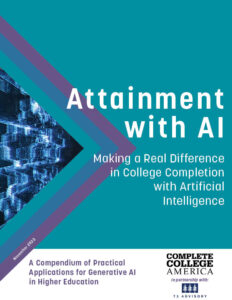
The AI playbook provides many practical ideas and concepts for higher education institutions and systems to employ generative AI for student success, completion, and equity. It categorizes 170+ use cases and 30+ sample prompts within three key operational frameworks:
- Organizational Effectiveness
- Strategic planning supported by predictive analytics and scenario modeling
- Optimized IT infrastructure through predictive maintenance and automated support
- Streamlined administration via automated compliance reporting
- Data analytics to guide strategic enrollment management and planning
- Predictive analytics for budgeting and financial decision-making
- Teaching and Learning
- Personalized learning content tailored to students’ needs and interests
- Immersive simulations for experiential learning
- Automated formative assessments and real-time feedback
- Student Experience
- Personalized academic planning, scheduling, and pathway optimization
- Early alert systems and targeted outreach to support student success
- Immersive learning through AR/VR and gamification
- AI chatbots for 24/7 tutoring, advising, and support
Read Attainment with AI: Making a Real Difference in College Completion with Artificial Intelligence
The AI Divide
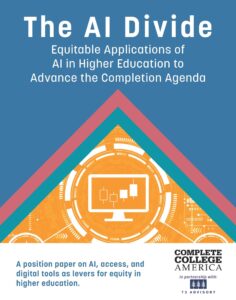
The AI Divide: Equitable Applications of AI in Higher Education to Advance the Completion Agenda complements the playbook by articulating an imperative for equity as systems, states, and institutions adopt AI and as technology companies expand their AI tools. Without thoughtful policies and oversight, AI risks amplifying unequal privilege that has historically created a system of inequity in higher education.
Key aspects of the position paper include:
– Mitigating algorithmic bias through diverse data and transparency
– Inclusive policymaking by engaging under-resourced institutions
– Proportional investment in AI capabilities, regardless of school type
CCA encourages institutions nationwide to thoughtfully explore AI’s potential to increase completion and success. However, equity must remain central, not an afterthought.
CCA will develop and convene the Complete College America Council on Equitable AI in Higher Education to advance an equitable AI landscape as an advisory body representing diverse institutional voices. CCA urges policymakers, tech firms, and funders to work closely with the Council to ensure AI serves all students justly.
Read The AI Divide: Equitable Applications of AI in Higher Education to Advance the Completion Agenda
